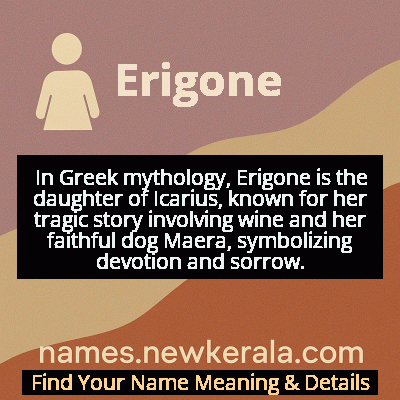Erigone Name Meaning & Details
Origin, Popularity, Numerology Analysis & Name Meaning of Erigone
Discover the origin, meaning, and cultural significance of the name ERIGONE. Delve into its historical roots and explore the lasting impact it has had on communities and traditions.
Name
Erigone
Gender
Female
Origin
Greek
Lucky Number
1
Meaning of the Name - Erigone
In Greek mythology, Erigone is the daughter of Icarius, known for her tragic story involving wine and her faithful dog Maera, symbolizing devotion and sorrow.
Erigone - Complete Numerology Analysis
Your Numerology Number
Based on Pythagorean Numerology System
Ruling Planet
Sun
Positive Nature
Leaders, ambitious, highly driven, self-reliant, innovative.
Negative Traits
Overly aggressive, domineering, impatient, selfish.
Lucky Colours
Red, orange, gold.
Lucky Days
Sunday.
Lucky Stones
Ruby, garnet.
Harmony Numbers
2, 3, 9.
Best Suited Professions
Entrepreneurs, managers, engineers.
What People Like About You
Courage, determination, leadership.
Famous People Named Erigone
Erigone of Athens
Mythological Figure
Central figure in Greek myth explaining the origin of the Aiora festival
Erigone (literary figure)
Classical Literary Character
Featured in Ovid's Metamorphoses as symbol of tragic devotion
Erigone (astronomical myth)
Mythological Reference
Associated with constellation Virgo in Greek star myths
Name Variations & International Equivalents
Click on blue names to explore their detailed meanings. Gray names with will be available soon.
Cultural & Historical Significance
In astronomical tradition, Erigone's transformation into the constellation Virgo represents the ancient Greek practice of encoding cultural narratives into the night sky. This celestial connection elevated her personal tragedy to cosmic significance, demonstrating how Greek mythology often bridged human experience and natural phenomena. The enduring presence of her story in classical literature, from lost Athenian tragedies to Ovid's Metamorphoses, shows how her narrative continued to resonate across centuries as a powerful exploration of grief, justice, and immortality through memory and celestial transformation.
Extended Personality Analysis
Individuals named Erigone typically exhibit a complex blend of intellectual curiosity and emotional intensity, reflecting their namesake's mythological journey. They often possess a strong sense of justice and determination, mirroring the original Erigone's relentless pursuit of truth about her father's murder. This can manifest as excellent problem-solving skills and persistence in facing challenges. However, their emotional depth also makes them particularly sensitive to injustice and betrayal, potentially leading to periods of introspection or melancholy when confronted with life's harsher realities.
Their personality often combines loyalty and devotion with a transformative resilience, enabling them to channel difficult experiences into creative or intellectual achievements. Like the mythological Erigone who turned tragedy into celestial immortality, modern bearers of the name frequently demonstrate an ability to find meaning and purpose in adversity. They tend to be perceptive observers of human nature, with a philosophical approach to life's challenges. While they may experience emotions deeply, they also possess the strength to transform personal struggles into sources of wisdom and inspiration for others, creating lasting impacts through their perseverance and emotional intelligence.
Modern Usage & Popularity
In contemporary naming practices, Erigone remains an exceptionally rare choice, primarily embraced by classical scholars, mythology enthusiasts, and parents seeking unique names with profound historical roots. The name appears most frequently in academic and artistic circles where its mythological significance is appreciated. While it doesn't rank on mainstream baby name charts, Erigone has experienced a modest revival as part of the growing interest in mythological and classical names. Its usage is particularly notable in Greece and among the Greek diaspora, though international adoption remains limited due to its complexity and strong association with tragedy. Modern parents who choose this name often value its connection to themes of loyalty, truth-seeking, and the transformative power of love. The name's rarity makes it distinctive while its classical heritage provides depth and cultural richness that appeals to those looking beyond popular naming trends.
Symbolic & Spiritual Meanings
Erigone embodies rich symbolic meanings that transcend her mythological narrative, representing the eternal human struggle between grief and transformation. She symbolizes the investigative spirit that drives humanity to seek truth, regardless of personal cost or emotional pain. The name represents the profound bond of filial devotion and the moral courage required to confront painful realities. Symbolically, Erigone connects earthly suffering with celestial transcendence, illustrating how personal tragedy can be transformed into eternal significance through memory and legacy.
Her story symbolizes the delicate balance between innovation and tradition, as her father's introduction of winemaking led to tragic misunderstanding. This represents the broader human experience of navigating cultural change and the potential consequences of introducing new ideas. The swinging ritual associated with her memory symbolizes both the cyclical nature of life and the human need to ritualize grief. Ultimately, Erigone represents the transformative power of love that persists beyond death, the pursuit of justice in the face of overwhelming odds, and the human capacity to find cosmic meaning in personal tragedy - themes that continue to resonate across millennia.

